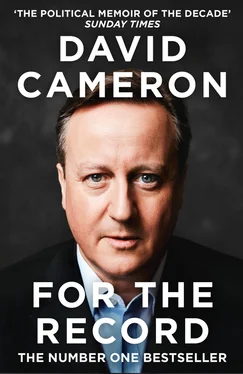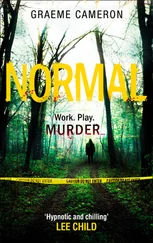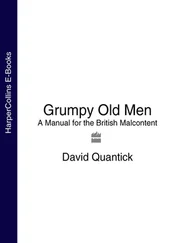In any event, there was another real possibility: a ‘rainbow coalition’ of Labour, Lib Dems and other minor parties, which together constituted an anti-Tory majority. I knew that some in our party would say, let them get on with it. Wait while they forge a shaky alliance and then watch it collapse, forcing a new general election in months.
But as the instability of that morning stretched into the distance, I felt it would be wrong to help inflict such an outcome on a country that needed direction. At this time of national need, stability was paramount.
Another option was a Conservative minority government propped up by the Lib Dems through a ‘confidence and supply’ agreement. It would be less precarious than a minority government, but far from stable or effective. We would never be able to pass all the reforms that were so desperately needed.
They were needed not just to fix our broken economy, but to mend our broken society. Thirteen years of Labour had left us with a school system that, despite the beginnings of worthwhile reform, encouraged mediocrity. We had a welfare system that discouraged work, a health system that was struggling under the weight of new demands and bureaucracy, and a criminal justice system that undermined social responsibility. For all the money they had thrown at problems, Labour had neglected the family, patronised the elderly, and ignored some of our most ingrained ills, from addiction to abuse. In opposition we’d spent five years preparing to put these things right, but I didn’t think a minority government with only a confidence and supply deal would be up to the task.
The final possibility was forming a full coalition between the Conservatives and the Lib Dems. Yet the Lib Dems were ideologically and historically closer to Labour than to us. Plus, minor parties never fared well in coalitions. What Lib Dem leader would be prepared to take such a risk?
Step forward Nick Clegg. His party, and its predecessor the Liberal Party, had been out of power for nearly a century, but his brand of sensible centrism and personal charisma gave it the biggest chance in decades to return to the forefront of British politics.
And what Conservative leader would want to join forces with a party that we had just been fighting ferociously for seats across much of the country, and that was seen by Conservative Party members and MPs as both left-wing and opportunistic?
Well, that would be me. I’d been MP for Witney in West Oxfordshire for nine years, and leader of my party for five. For most of my adult life I’d worked for the Conservative Party. I felt that my years navigating the British political system made me a match for this difficult task.
But more than that, I felt the courage of my convictions. I’d had about three hours’ sleep over the last couple of nights, yet I saw with complete lucidity what needed to happen. It wasn’t the obvious thing to do, but it was the right thing to do. I bounded out of bed and summoned my team – not to ask them what we should do, but to tell them.
The election result didn’t feel like an accident, I said. Something different had happened, because people wanted something different. Parliament hadn’t been hung for thirty-six years. I was advocating something that hadn’t been done in peacetime for 150 years: forming a full coalition.
I called the ‘big beasts’ of the Conservative Party to inform them of my approach. John Major, the last Tory leader to have won an election, eighteen years previously. Former leaders like Michael Howard and Iain Duncan Smith. Party grandees, and my leadership rivals from five years earlier, Liam Fox and Ken Clarke. And the candidate who had made it into the final two with me, David Davis.
The feedback was overwhelmingly that it would be right to reach out to the Lib Dems, although there was the odd exception. ‘Davis thinks it’s a bad idea,’ I reported to my team after I had hung up the phone. ‘Which means I’m probably on the right track.’
Then Nick Clegg appeared briefly on the TV. He had led his party to new heights in the polls, and then, as I have said, lost seats. Still – and politics can be so strange like this – he found himself holding the balance of power. He stayed true to what he had said before the election: that if there was a hung Parliament he would talk first to the party with the largest number of seats. The door to power opened a crack.
Soon afterwards, the actual door to power – the big, black one with ‘10’ on it – was flung open and Gordon Brown came out into Downing Street. He was ready, he said, to talk to the Lib Dems once they had spoken to us. I had thought that he would in some way concede that Labour had lost the election, and set the scene for his departure. George laughed at the suggestion: Brown, he said, would have to be prised out of No. 10 as he clung to the railings by his fingernails. He was right.
Fortunately, some of the spadework for a possible coalition with the Lib Dems had already been done. Before the election I had sanctioned George to compare our manifestos and prepare the ground for a deal with the potential kingmakers alongside my chief of staff, Ed Llewellyn. Diminutive and quietly spoken, Ed derived his authority from his intellect, decency and experience, having been chief of staff to Chris Patten in Hong Kong before the handover, and to Paddy Ashdown in Bosnia after the war.
They would work on this with Oliver Letwin, the West Dorset MP and the party’s policy chief. Oliver was kind, endearing and clever. He may have looked like an old-fashioned Tory MP, with red corduroy trousers and matching complexion, but no one had been more influential in helping me develop my brand of ‘modern, compassionate conservatism’ over the past five years.
I hadn’t taken part in any of the coalition preparation. I wanted to be single-minded about winning, and not to dissemble if people asked me what I had done to prepare for a coalition.
A huge amount would rest on the speech I would give, and we chose St Stephen’s Club as the venue. Commentators made much of the fact that overlooking me was a portrait of Winston Churchill, the last prime minister to lead a coalition, in his case during the Second World War. But it was the ghost of another great PM, the club’s first patron, Benjamin Disraeli, whose presence I really felt.
‘England does not love coalitions,’ Disraeli famously said. In many ways, I agreed. I had made endless speeches about supporting our electoral system because it produced decisive results and strong governments. In Europe it often took months to form a government – months of political instability that recession-battered Britain could not afford. But I felt that, given our circumstances, coalition really was the right choice – and I believed I could make it work.
I stepped up to the lectern to make my pitch. A strong, stable government that had the support of the public to take the difficult decisions was, I said, needed to put the country back on track. I didn’t use the word ‘coalition’ – I didn’t have to. It was clear that a coalition was on the table from the fact that I specifically talked about going beyond a confidence and supply deal.
I went through the key elements of the Lib Dem manifesto, and set out where we could ‘give ground’ and ‘change priorities’, giving prominence to cutting carbon emissions, raising the tax threshold for the lowest-paid and speeding up the introduction of a ‘pupil premium’, so schools with children from the poorest homes would receive more money. I indicated that we were also open to political and constitutional reform, which was hugely important to the Lib Dems, who had long campaigned for changes to the voting system.
The approach was generous and front-footed. We were making concessions before discussions had even started – and we were doing so in public.
Читать дальше












